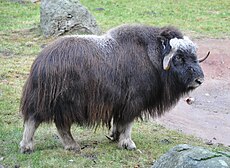Musk is the smelly stuff that oozes from glands near a male musk deer's bottom - mm, lovely - and for centuries people have rushed to rub it all over themselves.

No, really, they do: we humans really are very odd creatures, you know.
Well, it does smell gorgeous.
Civets produce something similar, and so do otters, though people don't seem to be so keen on otter-oozings. Perhaps the smell of otter oozings reminds people of the fish that make up the otter's diet.
There are other things that smell of musk, too: various American Mimulus flowers:

the delightful musk duck:

the European Musk Mallow:

the muskmelon (which includes the canteloupe and honeydew);
the musk orchid:

the musk ox:

and the musk rose:

The musk turtle is also known as the stinkpot. For this reason I suspect the people who named this creature of sarcasm.
The muskrat (a large vole-like creature used for fur coats) doesn't as far as I know smell of anything much. The musk in its name comes from an Algonquian word that's nothing to do with smells.
The easiest way to spot a bit of musk will probably be either on a fragrant lady near you - or perhaps a fragrant man - or at a melon stall.
I think I'll probably get into less trouble sniffing melons.

Spot the Frippet: musk. This word comes from the Latin muscus, and has come to us through Greek, Persian and Sanskrit from mū
I've now got otter-oozings stuck on the brain!
ReplyDeleteAnd I'll never look at an otter the same again.
Thanks Sally!! :)
You're very lucky, Jingles. Otters are so rare here in England that any sighting, however nasally challenging, is a source of great excitement.
DeleteStill, I'm glad to have added an olefactory element to your otter-watching.